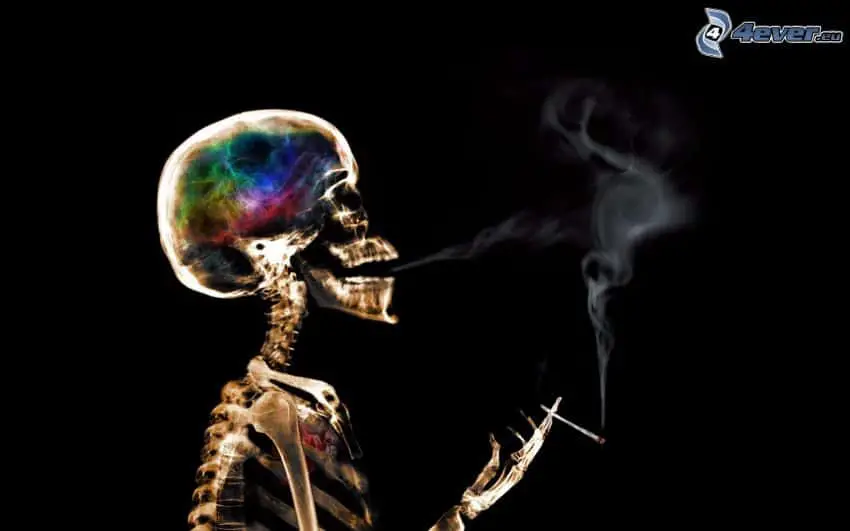Comedian Mitch Hedberg famously joked that ‘quitting smoking’ was as hard as ‘starting flossing’. LOL
But he might be onto something. Both quitting smoking and starting flossing are goals that require you to disrupt deeply ingrained behavioral patterns. Of course with smoking cigarettes, there’s also a chemical nicotine dependency to deal with as well.
But why is it that some people can quit smoking ‘cold turkey’ with no problem, while others struggle to quit smoking for years?
I personally know a few people who are in the ‘quit cold turkey’ camp and they all have similar stories. Usually it’s a traumatic event or a life epiphany that forever changes their perspective on cigarettes.
Nobody want’s a traumatic event, but what about a new life experience that could lead to new perspectives or epiphanies?
There’s a few new biological technology breakthroughs that are changing the game for those looking to quit smoking cigarettes and curb their nicotine addiction.
We are of course talking about psilocybin containing fungi mushrooms and Cannabidiol (CBD).
Both compounds have previously been banned by the US government, but CBD was made legalized on the federal level in 2018, and psilocybin received a recommendation for fast track approval by the FDA in 2019.
In this article we’ll seek expert opinions and updates as we seek answers on using psilocybin and CBD to quit smoking cigarettes.
Let’s Dive In.
Why Do You Smoke Cigarettes?
Why Are You Addicted?
There’s 3 main obstacles to quitting smoking cigarettes. The biggest and toughest obstacle is the emotional aspect of smoking. Once you define and ovecome the emotional barrier that’s feeding your addiction, the chemical and behavioral aspects don’t stand a chance.
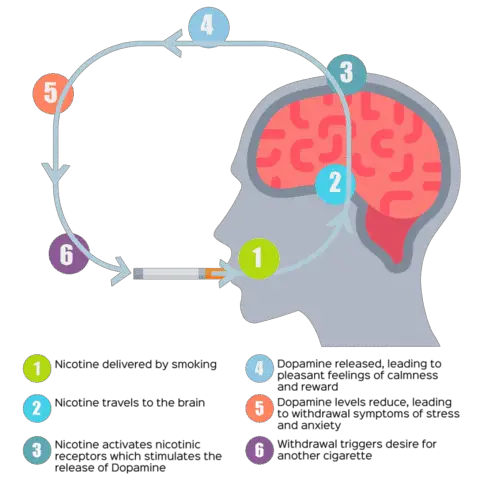
1. Psychological (emotional) Addiction Aspect of Smoking Cigarettes
With most people, there’s a root cause behind every addiction. And people usually “start” smoking, and “continue” smoking cigarettes for two different reasons.
A lot of smokers say they smoke because of anxiety & stress control. But the real reason is deeper than that. Think why do you have anxiety?
According to the experts at Alpine Recovery Lodge, the underlying causes behind many addictions often surprise the person who is struggling with the addiction in the first place.
To identify the root cause, you’ll need to focus on why you first started smoking. Although there could be 100’s of potential causes, often the real root cause can be boiled down to a few big-picture categories.
Emotional pain, trauma, or lack of emotional support. Addictions start as the outlets for which we unconsciously respond to these deep rooted issues. Over time the psychological (mental) addiction become engraved in daily habits, and then the nicotine takes hold and turns cigarettes into a physical behavior, and physical chemical addiction.
2. Physical (chemical) Aspect of Nicotine Addiction
How well do you know why you’re addicted? Here’s what going on inside your brain.
Every-time you smoke a cigarette, it triggers a ‘nicotine receptor’ in your brain , which is known as the “A4B2 receptor”.
The nicotine (A4B2) receptor then gives your brain a small hit of dopamine, (the “”happiness molecule””).
Your brain’s dopamine release then gives your body a sense of happiness and pleasure. Soon, you’re brain starts to chemically re-structure to expect happiness from cigarettes.
This is why nicotine is such an addictive substance. Once your cigarette is done, the A4B2 nicotine receptors will want another hit of nicotine to release another hit of dopamine.
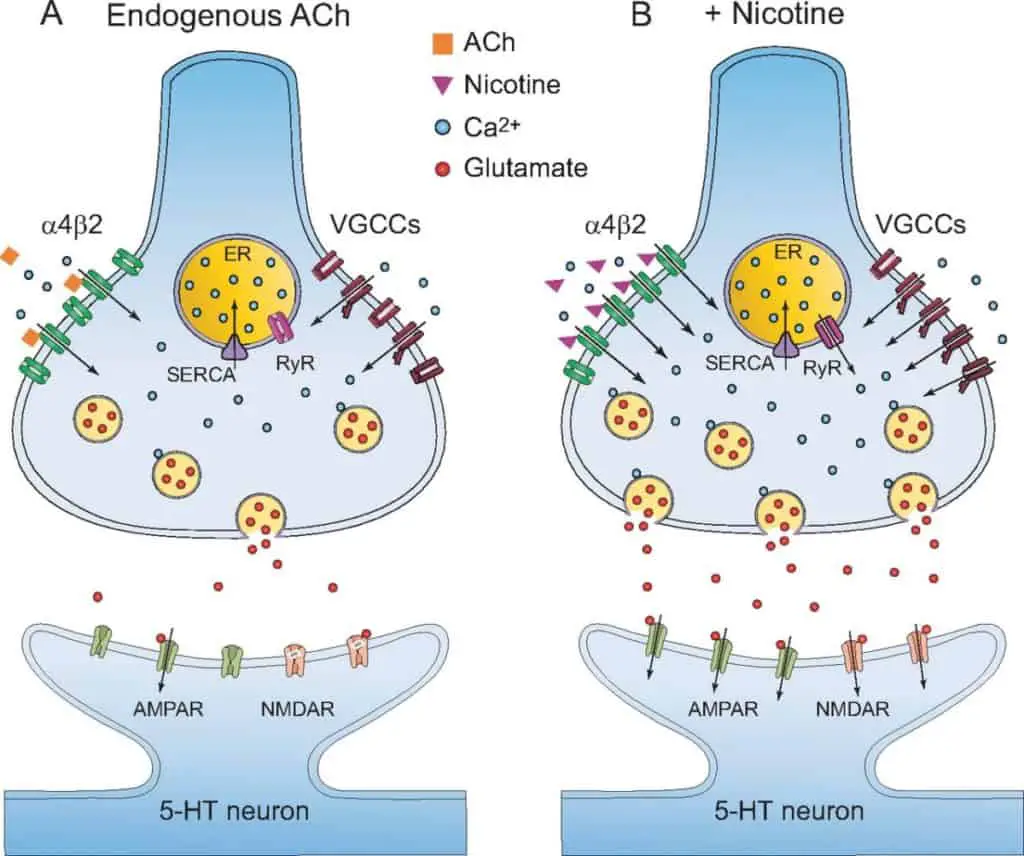
Thus the addictive craving of smoking.
Your ‘A4B2 nicotine receptors’ will eventually start multiply in the brain, and the longer you smoke, the more A4B2 nicotine receptors you will have…All of which will crave nicotine.
The more ‘A4B2 nicotine receptors’ you have, the stronger your craving for more nicotine will be.
The good news is, that over time, your A4B2 nicotine receptors will die off and will return back to normal levels. Said another way, the more you feed your cigarette addiction, the more it will want to be fed.
3. Physical (behavioral) Aspect of Cigarette Addiction
The behavioral aspect of cigarette addiction is the actual ingrained habit of smoking. For example, the feel of a cigarette in your hand as you drive. Or the habit of smoking after a meal.

After years of smoking you’ll develop a ‘muscle memory’ for the physical feel of smoking, and cigarettes will become part of your daily routine and habitual patterns.
Eliminating these ‘muscle memory cues’ is a difficult part of beating addiction and often leads to relapses.
According to psychologist and Certified Hypnotist Michael Salerno, most habits take a minimum of 3-4 weeks to overcome. This is the first “”tipping point”” you’ll need to get past in order for your brain to overcome your most ingrained smoking behaviors.
But, more extensive research has revealed that it can take up to 8 months to break a habit. So after a milestone date of 1 year, you’re really in good shape.
Cigarette And Nicotine Addiction Withdrawal Symptoms
Once you start smoking cigarettes, withdrawal symptoms can keep you smoking. Similar with most addictions, physical withdrawal symptoms aren’t pleasant, and can make you feel physically sick for a few days.
When first stop smoking cigarettes, your brain can no longer make the same amount of dopamine that it’s used to receiving.
Cutting off your body’s adapted level of dopamine, can shock the system at first causing a crash similar to the flu.
This leads to withdrawal symptoms which most commonly include:
- Anxiety
- Depression
- Weight gain
- Headaches
- Problems focusing
- Trouble sleeping
- Generally feeling restless or irritable.
Nicotine withdrawal symptoms can begin as little as 2 hours and can last anywhere from a couple of days to minor symptoms lingering a couple of months….
The severity and duration of withdrawal depend on a few factors such as how long you’ve been smoking, mental toughness, and genetics.
Cigarette Addiction Summary:
Most people smoke as a ‘crutch’ to alleviate some form of stress or anxiety, which in itself is usually caused by a deeper rooted emotional issue.
The nicotine in the cigarette then develops this ‘crutch’ into both brain chemistry changes in your A4B2 nicotine receptors, and physical muscle memory.
now that we’ve covered the why, let’s dive into what CBD and psilocybin both have to offer as solutions.
Psilocybin as a Brand New Approach For Cigarette Addiction
Psilocybin is the compound found in certain mushrooms. Yes, “magic mushrooms”, “shrooms”, or “psychedelic mushrooms“. But taken at the right does, and in the right circumstance, psilocybin doesn’t have to make you ‘trip’.
Johns Hopkins researchers published a study that found participants taking psilocybin achieved an 80% abstinence in cigarette smoking lasting over six months.
At 12-month follow-up 67% remained cigarette free. Also after 12 months, 86.7% of participants (even those who replaced) rated their psilocybin experiences among the five most personally meaningful and significant experiences of their lives.
Compare this to the 35% success rate for patients taking ‘Verenicline’, which is widely considered to be the most effective drug for nicotine addiction.
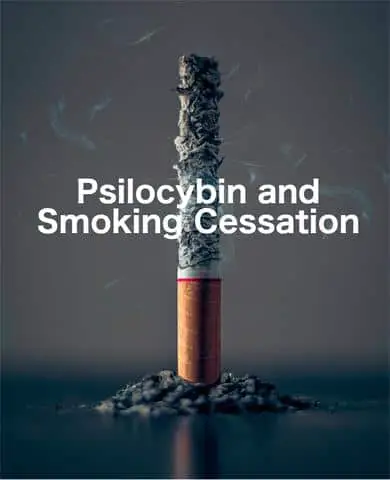
Psilocybin treatment to quit smoking is so effective because it address addiction at it emotional root cause.
In the eyes of Rob Roscow, chief scientific officer and co-founder of Mydecine (a Biotechnology company)
“psilocybin, plus therapy is acting to reset people’s mental behaviors and habits and thought patterns around their addictive substance or behavior of choice. Whereas the traditional therapies are really only dealing with cravings, and physical withdrawal symptoms.”
Matthew W. Johnson, Ph.D is a Professor at Johns Hopkins, is an expert on psychedelics substances. Dr. Johnson believes that “When administered after careful preparation and in a therapeutic context, psilocybin can lead to deep reflection about one’s life and spark motivation to change,”
If we know anything about quitting cigarettes cold turkey, we know it takes either deep motivation or a perception change, both are possible with psilocybin treatment.
How Does CBD Help With Cigarette Addiction?
What exactly is CBD and how does it work? This is the basics for understanding how CBD can help you quit smoking cigarettes.
CBD is a compound that comes from the cannabis plant, but (unlike THC) CBD doesn’t get you ‘high’.
In 2018, CBD was made federally legal at the highest levels of government, and again, it doesn’t get you ‘high’.
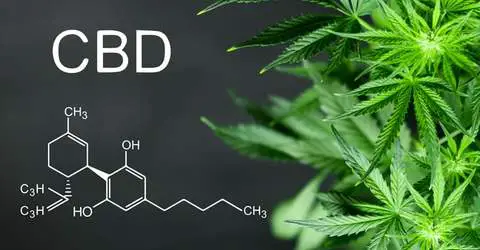
CBD is one of over 100 naturally produced compounds that are found in the Cannabis plant. These 100+ compounds are called Cannabinoids
Cannabinoids from the cannabis plant are important because they directly interact with the human body by attaching themselves to a network of receptors which are part of our Central Nervous System –
All mammals produce cannabinoids naturally within the body.An example, of one of the human body’s natural cannabinoids is the molecule anandamide. And after ingesting CBD, Anandamide levels are increased in the body. (We’ll come back to why this is important later)
This network of receptors inside the human body is known as the Endo-Cannabinoid System. And the main role of the Endocannabinoid System, is to maintain balance and homeostasis inside the body.
To sum it up, the cannabis plant produces cannabinoids, which fit like a ‘lock and key’ into our human endo-cannabinoid system.
It’s this interaction with the endo-cannabiinoid system that is critical for understanding how CBD can help you cut back on smoking weed (THC)
CBD And The Endo-Cannabinoid System (ECS) Simple Explanation
The Endo-Cannabinoid System is one of our most important internal bodily systems.
The ECS is responsible for maintaining balance in the human body and works similar to a thermostat.
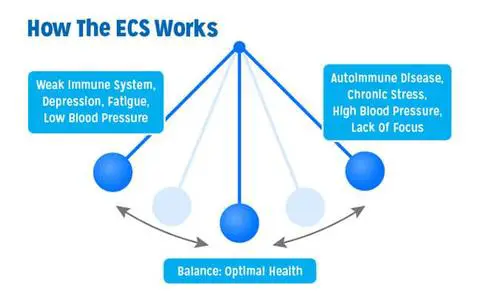
If the temperature in your house if too cold or too hot, the thermostat kicks in to normalize the temperature.
If you have anxiety, inflammation, or a pain response activated in your body, then your endo-cannabinoid system kicks on to normalize (or balance) your body’s response.
How Can CBD Help You Quit Smoking Cigarettes ?
CBD does not directly effect the psychological (emotional) addiction to smoking cigarettes, but CBD does attack both the chemical and physical habit (behavioral) aspect of smoking.
CBD vs. Cigarette Chemical Addiction
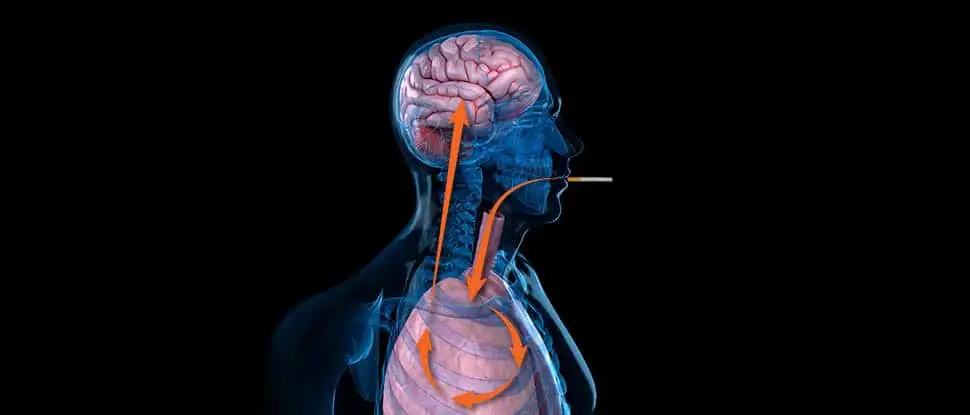
In 2013 a study was published in Addictive Behaviors which found that people who consumed Cannabidiol (CBD) smoked, on average, 40% fewer cigarettes than usual.
We discussed the research above which has found that cigarette smoking stimulates the ‘A4B2 nicotine receptors’ which in-turn release dopamine. And research has also taught us that, over time, long term smoking increases the abundance of the A4B2 nicotine receptors, thus creating an even stronger desire to smoke.
New research has also taught us that taking CBD stimulates the Endo-Cannabinoid system to increases our natural levels of anandamide.
Multiple studies published by both “The American Society for Pharmacology and Experimental Therapeutics” ….
and “The National Institute on Drug Abuse, Intramural Research Program” come to the conclusion that Anandamide reduces the function of the A4B2 nicotine receptor.
The study also concludes that by taking CBD and elevating brain anandamide levels, it would be an effective strategy to reduce relapse to nicotine-seeking behavior.
Summary:
1. Smoking cigarettes increases the abundance of nicotine receptors in the brain.
2. Taking CBD increases anandamide levels in the brain.
3. Anandamide reduces the effectiveness of the nicotine receptors.
CBD vs. Cigarette Behavioral (physical) Addiction
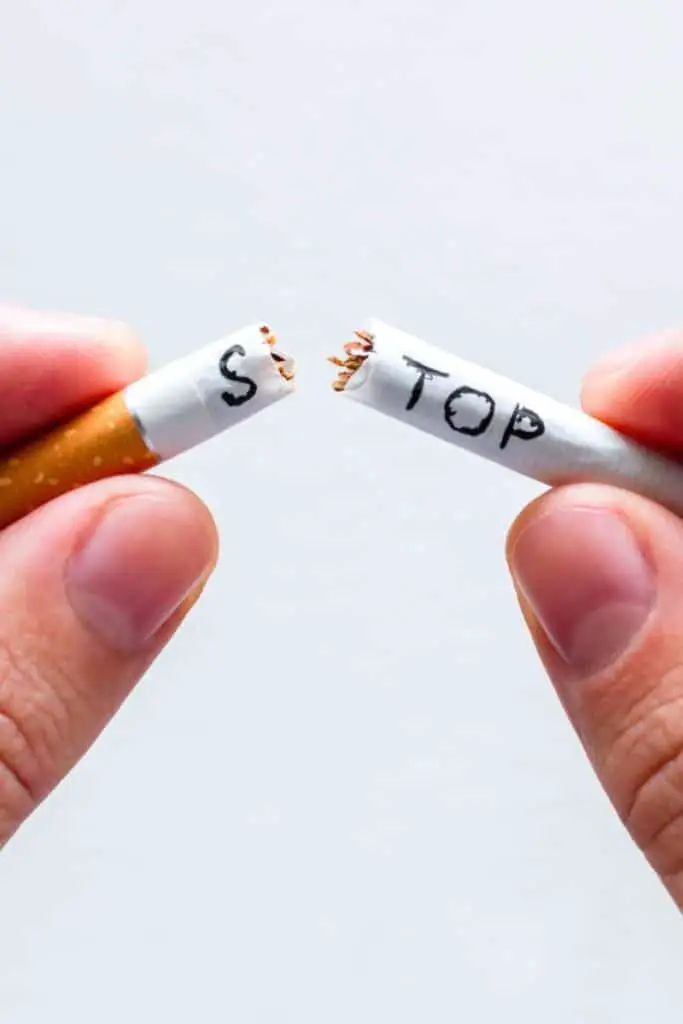
Recent studies have found that CBD does in fact “reduce the noticeability of addictive cues.”
I personally tried CBD for 30 days and found exactly the same thing to be true. I noticeably had less urges to fall into daily patterns.
Almost like a rut in my brain was suddenly much less deep and easier to get out of.
But my biggest ‘take-away’ was how much easier I found it to make changes in my daily routine.
In other recent studies, CBD has also been found to reduce the overall consumption of cigarettes for those addicted to nicotine.
I went in to the 30 day experiment feeling skeptical, but after 2-3 weeks, I noticed that I has just ‘forgot to smoke’ a couple times with-out even thinking about it.
That’s exactly what the study found – CBD helps by lessening addictive cues.
CBD Also Helps With Nicotine Withdrawal Symptoms
Aside from reducing the effectiveness of the nicotine receptors at the source….
CBD’s role in treating cigarette addiction starts to make even more sense when you take into account some of its other medical benefits which can reduce the unpleasant nicotine withdrawal symptoms.

For example, stress relief:
Taking CBD can help you through the nerves of quitting nicotine by reducing the severity of the stress, tension & anxiety that typically come with withdrawal.
According to research done by the British Journal of Pharmacology….,
CBD interacts with a receptor in the brain known as the 5-HT1A serotonin receptor…. This interaction can reduce symptoms and our body’s negative responses to stress.
Best CBD Products to Quitting Smoking Cigarettes

As described above, there are two aspects that CBD attacks for cigarette and nicotine addiction.
- A physical (muscle memory) aspect
- A mental, chemical addiction in the brain.
To combat cigarette addiction CBD oil combined with a CBD vape may give you the best chance to kick the habbit.
Vaping CBD can help with the physical (behavioral) aspect of curbing cigarette addiction by replacing the oral fixation (physical muscle memory) of smoking an cigarette with a CBD vape..
But vaping doesn’t get enough CBD into your system to cease the mental and chemical dependency or reduce withdrawal symptoms.
This is why you may want to try a “2 pronged” approach of using CBD oil to get the CBD absorbed and accumulated in the blood stream and only using the CBD vape as needed.
Importance of CBD’s Cumulative Effect to Quit Smoking
What does this mean?
The longer you take CBD the more it accumulates in your body and in your bloodstream. This accumulation of CBD over time is called the cumulative effect.
Because of the cumulative effect, CBD works better over time (usually at least 2 weeks) before CBD starts to work optimally.
The cumulative effects of CBD is why doctors tell you not to judge CBD’s effects until you have been on CBD for several weeks and for some symptoms even longer.
Do You Really Want To Quit Smoking Cigarettes?
Ask yourself….DO I REALLY WANT TO QUIT?

If the answer is yes then you’re on the right path and with a bit of mental focus and self-control you WILL succeed in quitting.
CBD can ease the pain of withdrawal and make quitting easier, but it can not quit for you. CBD can be a successful tool to get you over the hump of nicotine addiction.
Conclusion: Psilocybin And CBD To Quit Smoking
There’s no ‘magic pill’ to quit smoking. If you don’t want to quit smoking (like really want to) then no treatment is going to help you.
you can’t force someone to love you, and you can’t force some to quit smoking. It has to be an internal decision. But once that decision is made, psilocybin treatments are the most promising new technology with long lasting effectiveness.
On top of psilocybin treatments to address the emotional reason for smoking, CBD can help release the grip of the chemical and habitual patterns that your body associates with smoking. Also CBD has been proven to help ease withdrawal symptoms.
I personally used CBD for 30 days to quit smoking weed (deeply ingrained 10 year behavioral pattern) and found it to be an incredibly useful tool to curb ‘addiction cues’.
Ultimately it’s up to you whether to not you want to quit smoking cigarettes.
If you’ve used either CBD or psilocybin to quit smoking please let us know your thoughts.
Check Out Out Our Other Interesting Articles About CBD…
- Using Psilocybin and CBD To Quit Addictions
- What’s the Difference: Marijuana vs. Cannabis vs. CBD vs. THC vs. Hemp ?
- CBD vs Xanax: CBD As A Natural Alternative to Xanax for Anxiety
- CBD Oil Praised As Natural Remedy for Mental Wellness
- This Is The Reason Why CBD (Might) Show Up On Your Drug Test ?
- DON’T Buy CBD On Amazon: Here’s Why
- Using CBD To Quit Weed: The Science (and my experience)
- CBD vs. Zoloft: A Natural Alternative For Anxiety?
- Why Does Weed Make (Some) People Feel Paranoid ? Cannabis Explained
- Why Is Cannabis (still) Illegal in the United States ?
- CBD As a Prednisone Alternative For Dogs
Loved what you read?
Hit that share button and let the world in on the secret – we’d be thrilled!
Got thoughts? We’re all ears for your feedback, corrections, or a good old chat. Don’t be shy; drop us a line.
And hey, don’t miss out on our curated list of must-reads in the recommended books section.
Big thanks for diving in with us today!


